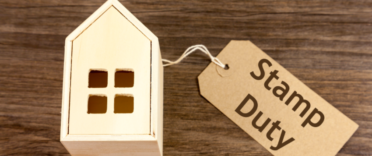 Stamp Duty is a property purchase tax that can make up a large portion of the overall cost of buying a property. In this article, we look at whether it is possible to add Stamp Duty to your mortgage as well as whether adding Stamp Duty to your mortgage makes financial sense.
Stamp Duty is a property purchase tax that can make up a large portion of the overall cost of buying a property. In this article, we look at whether it is possible to add Stamp Duty to your mortgage as well as whether adding Stamp Duty to your mortgage makes financial sense.
What is stamp duty?
Stamp duty is the property tax payable to HM Revenue & Customs when you buy a property or piece of land. It is called Stamp Duty Land Tax (SDLT) in England and Northern Ireland but is called Land Transaction Tax (LTT) in Wales. If you buy a property in Scotland, it is known as Land and Buildings Transaction Tax (LBTT). Stamp Duty must be paid as a lump sum within 14 days of the completion of your property purchase and so cannot be paid in instalments.
The amount of stamp duty tax that you will pay depends on the purchase price of the property and differs based on whether you are a first-time buyer. The rate of stamp duty is also charged differently for an additional property purchase such as a buy-to-let property.
Stamp duty rates
Stamp Duty is paid as a percentage of the property purchase price based on the thresholds and rates shown in the table below.
| Property price | Stamp duty payable (Main residence) | Stamp duty payable (Additional properties) |
| £0 - £250,000^ | 0% | 3% |
| £250,001 - £925,000 | 5% | 8% |
| £925,001 - £1,500,000 | 10% | 13% |
| > £1,500,000 | 12% | 15% |
^First-time buyers receive an increased nil-rate threshold of £425,000 as long as the property price is £625,000 or less. (The nil-rate threshold for purchases of land or non-residential property is £150,000)
You can more information about Stamp Duty in our article, "Everything you need to know about Stamp Duty".
Can you pay stamp duty with your mortgage?
Yes, some lenders can arrange your mortgage in a way that allows you to add the stamp duty tax to your mortgage loan but you should think carefully before choosing to do this. It is important to understand that you will incur interest on the total mortgage loan and so adding stamp duty to your mortgage will mean you pay more interest over the term of your mortgage. Additionally, by adding the stamp duty fee to your mortgage, you will impact your loan-to-value (LTV) ratio. Generally speaking, the higher your loan-to-value ratio, the higher the rate of interest that you will pay as mortgage lenders typically offer better mortgage deals for those that have a lower LTV. Adding stamp duty fees to your mortgage could take the LTV into a higher band, meaning you may be offered less favourable mortgage terms with your lender at a higher interest rate.
How to add stamp duty to your mortgage
There is no specific mortgage product or arrangement that allows you to add stamp duty to a mortgage. Instead, you could decide to use some of your deposit to pay your stamp duty, meaning you'll ultimately need to borrow more to purchase the property. Borrowing more on your mortgage so that you can pay your stamp duty isn't usually advised as you will be paying interest on the additional amount over a long period of time. As such, most independent mortgage brokers would usually advise against it. Additionally, reducing your deposit could lower your loan-to-value ratio and so could mean that you end up paying a higher rate of interest on your mortgage.
Should you add stamp duty to your mortgage?
You should, wherever possible, save enough money to cover the stamp duty costs rather than add these to your mortgage loan as this increases the cost of buying your house.
It can be a good idea to speak with a mortgage broker* to understand the ideal LTV ratio you will need to achieve to secure a good mortgage deal that you can afford. Once you know this, it can be easier to work backwards to ensure you build enough funds to cover your stamp duty costs over and above any other purchase costs.
You can find more information about this in our article, "How much are the fees when buying a house?".
Example - Adding stamp duty to your mortgage
| Without adding stamp duty to mortgage (£350k property) | Adding stamp duty to mortgage (£350k property) | |
| Mortgage required | £300,000 | £305,000 |
| Deposit | £50,000 | £45,000 |
| LTV | 85.71% | 87.14% |
| Stamp Duty | £5,000 - Paid from savings | £5,000 - Paid by reducing the deposit and borrowing more |
| Example monthly repayment | £1,736 | £1,765 |
| Total Payable | £330,286 | £335,766 |
Based on a mortgage term of 25 years
In the above example, you can see that by adding the stamp duty cost to the mortgage, the house deposit is reduced from a possible £50,000 to £45,000, increasing the LTV ratio from 85.71% to 87.14%. Although this may not seem like a significant increase, in some circumstances, the change in LTV could push you into a higher LTV tier, meaning you are unable to access the best mortgage rates. Also, the interest will be charged on a greater loan amount, increasing your monthly mortgage repayments. So, wherever possible, you should try and put money aside for the stamp duty in addition to other mortgage costs such as solicitor and valuation fees.
Summary
While adding stamp duty to your mortgage is technically possible, it is important to remember that adding these costs to your mortgage will increase your overall spending.
Before you choose to spread your stamp duty bill across your mortgage term, speak to a mortgage broker to understand how much extra it is likely to cost compared to paying it upfront. Sometimes, understanding the extra cost will help you to see whether adding stamp duty to your mortgage is really worth it. If you do not have a mortgage broker, you can source one using VouchedFor*. The website allows you to search from a list of mortgage brokers in your area as well as those that work nationwide. You can make your selection based on the mortgage brokers' expertise, charges and customer reviews. You will find that some mortgage brokers do not charge a fee if they successfully arrange your mortgage as they are paid a procuration fee by the lender, so you may be able to get mortgage advice free of charge.
Further reading
- What to look for when buying a house and getting the best deal
- Negotiating house prices: How to get the best price
- How to find a mortgage broker you can trust
If a link has an * beside it this means that it is an affiliated link. If you go via the link, Money to the Masses may receive a small fee which helps keep Money to the Masses free to use. The following link can be used if you do not wish to help Money to the Masses or take advantage of any exclusive offers - Vouchedfor





